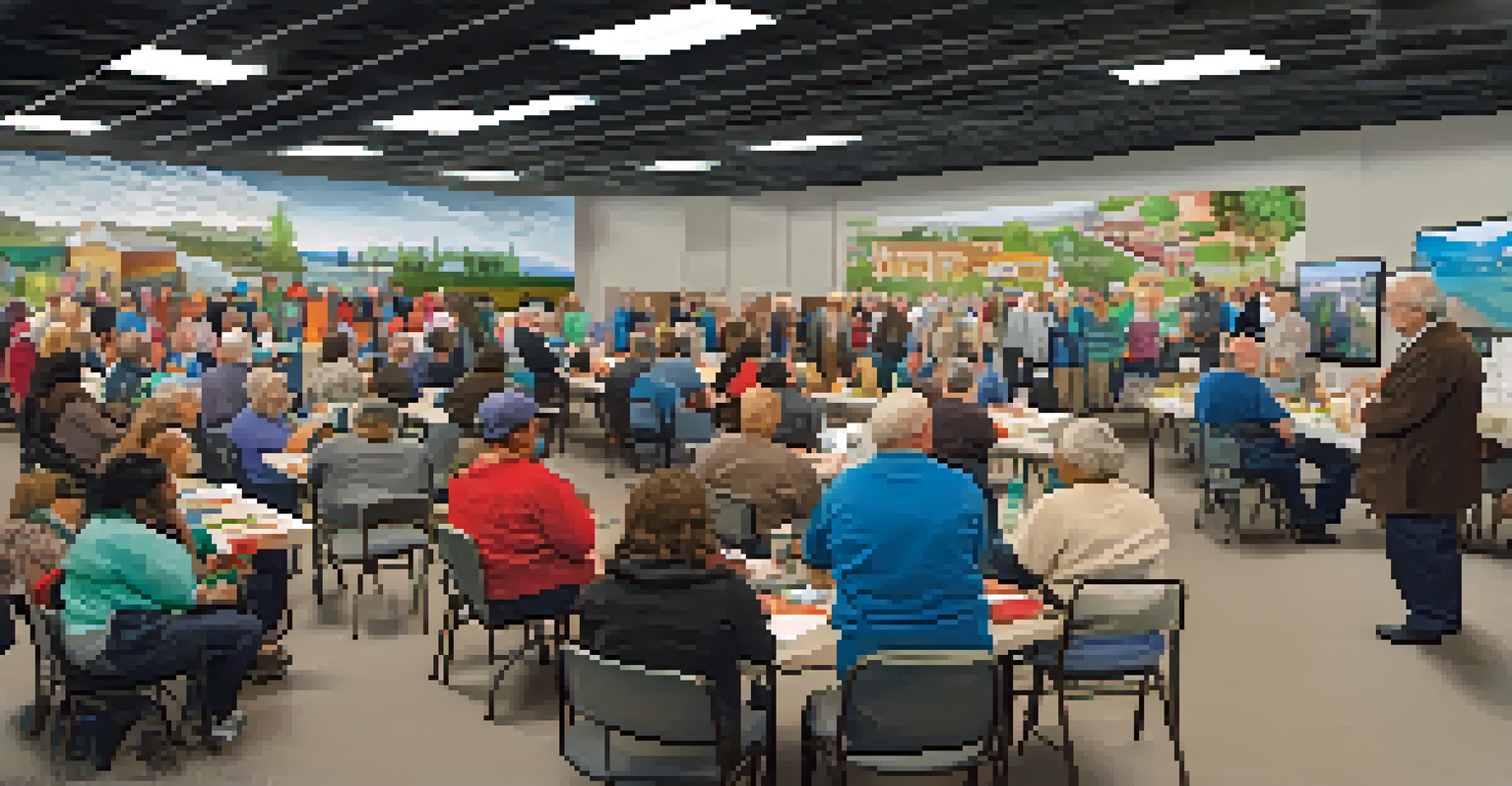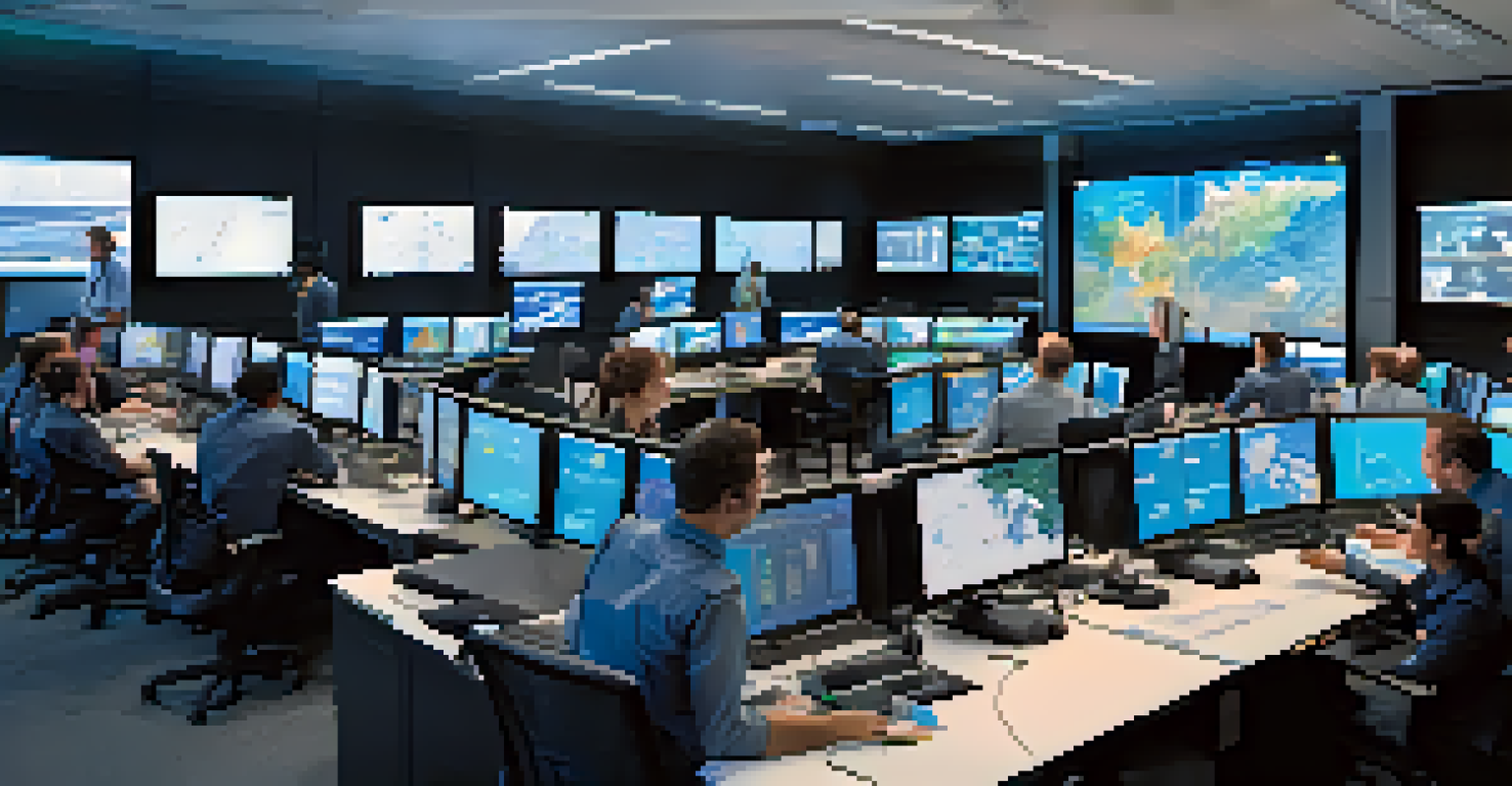The Role of Local Agencies in Sacramento's Disaster Response

Understanding the Landscape of Disaster Response in Sacramento
Disaster response in Sacramento involves a complex network of local agencies. These organizations work together to ensure the safety and well-being of residents during emergencies. By understanding the landscape, we can appreciate how these agencies coordinate their efforts to mitigate chaos and provide relief.
Disasters are not just natural events; they are social events and can only be understood in the context of the communities they impact.
Local agencies, such as the Sacramento Office of Emergency Services, are pivotal in crafting response plans. They assess risks, develop strategies, and train personnel to handle a variety of disasters. This proactive approach helps the community stay prepared and capable when crises occur.
Moreover, the collaboration among various agencies ensures a comprehensive response. Fire departments, law enforcement, and public health organizations all play vital roles. Each agency brings its expertise, creating a robust support system that can react swiftly to emergencies.
The Importance of Preparedness Training for Local Agencies
Preparedness training is at the heart of effective disaster response. Local agencies in Sacramento invest time and resources into training personnel, which is crucial for ensuring everyone knows their roles during a crisis. This training ranges from basic first aid to advanced emergency management techniques.

Simulated drills and real-world exercises are essential components of this training. They allow agencies to practice their response plans and identify potential weaknesses. By regularly engaging in these activities, agencies can refine their strategies and enhance their readiness for actual events.
Collaboration Enhances Disaster Response
Local agencies and community organizations work together to address diverse needs, improving support during emergencies.
Furthermore, community involvement in preparedness training fosters a culture of resilience. When residents understand the plans in place and how to respond, it creates a safer environment for everyone. Local agencies encourage citizens to participate in workshops and events to build this vital connection.
How Local Agencies Collaborate with Community Organizations
Collaboration between local agencies and community organizations enhances disaster response efforts. By working together, these entities can pool resources and expertise to provide more effective support during crises. This partnership is crucial in addressing the diverse needs of Sacramento's population.
The best way to predict the future is to create it.
Community organizations often have unique insights into the specific challenges faced by residents. Local agencies can leverage this knowledge to tailor their response strategies. For example, organizations serving vulnerable populations can help identify those most at risk in emergencies.
Additionally, joint initiatives, such as resource distribution and public information campaigns, ensure that vital information reaches residents. These collaborations help to build trust and promote community engagement, which are essential during disaster situations.
The Role of Technology in Enhancing Disaster Response
Technology plays a transformative role in disaster response efforts. Local agencies in Sacramento utilize various tools and platforms to streamline communication and coordination during emergencies. From early warning systems to emergency management software, these technologies are invaluable.
For instance, social media has become a crucial tool for sharing real-time updates and safety information. Local agencies can quickly disseminate alerts and connect with the community, ensuring that everyone remains informed. This proactive communication can save lives during critical situations.
Technology Transforms Emergency Efforts
Innovative tools and platforms streamline communication and enhance coordination, leading to more effective disaster responses.
Moreover, data analytics helps agencies assess risks and allocate resources effectively. By analyzing patterns and trends, agencies can make informed decisions that enhance their response capabilities. The integration of technology ultimately leads to a more efficient and effective disaster response.
Public Engagement: Empowering Residents in Disaster Situations
Public engagement is a cornerstone of effective disaster response. Local agencies in Sacramento recognize the importance of empowering residents to take an active role in their safety. By providing information and resources, agencies can help individuals prepare for emergencies.
Workshops and community events offer residents the opportunity to learn about disaster preparedness. These initiatives cover topics such as evacuation routes, emergency kits, and communication plans. When residents are informed, they can respond confidently and swiftly during a crisis.
Furthermore, fostering a sense of community encourages collaboration among neighbors. When residents know each other and share information, they can support one another during difficult times. This communal spirit can significantly enhance the overall resilience of Sacramento.
Evaluating the Effectiveness of Local Agencies' Responses
Evaluating the effectiveness of disaster response is essential for continuous improvement. Local agencies in Sacramento regularly assess their performance following emergencies to identify successes and areas for growth. This evaluation process helps refine strategies and enhance future responses.
Feedback from the community plays a critical role in this evaluation. Residents can provide valuable insights into their experiences during emergencies, highlighting what worked well and what could be improved. Engaging with the community ensures that agencies remain responsive to the needs of those they serve.
Community Engagement Empowers Residents
Public involvement in preparedness initiatives fosters resilience and equips residents to respond confidently during crises.
Moreover, lessons learned from past disasters inform training and preparedness efforts. By analyzing previous responses, local agencies can adapt their plans to better address emerging challenges. This commitment to evaluation and improvement ultimately strengthens Sacramento's disaster response framework.
The Future of Disaster Response in Sacramento
As Sacramento continues to grow, the future of disaster response will evolve alongside it. Local agencies are already exploring innovative approaches to enhance their capabilities. This forward-thinking mindset is essential for effectively addressing the challenges posed by climate change and urbanization.
Investing in new technologies, such as drones and AI, can improve situational awareness and response times. Local agencies are also focusing on building long-lasting partnerships with community organizations to strengthen their support networks. This collaborative approach will be crucial in navigating future emergencies.

Additionally, ongoing public education and engagement will remain vital. Ensuring that residents are informed and prepared will empower them to contribute to their safety during disasters. By prioritizing these efforts, local agencies can create a resilient Sacramento ready to face whatever challenges lie ahead.